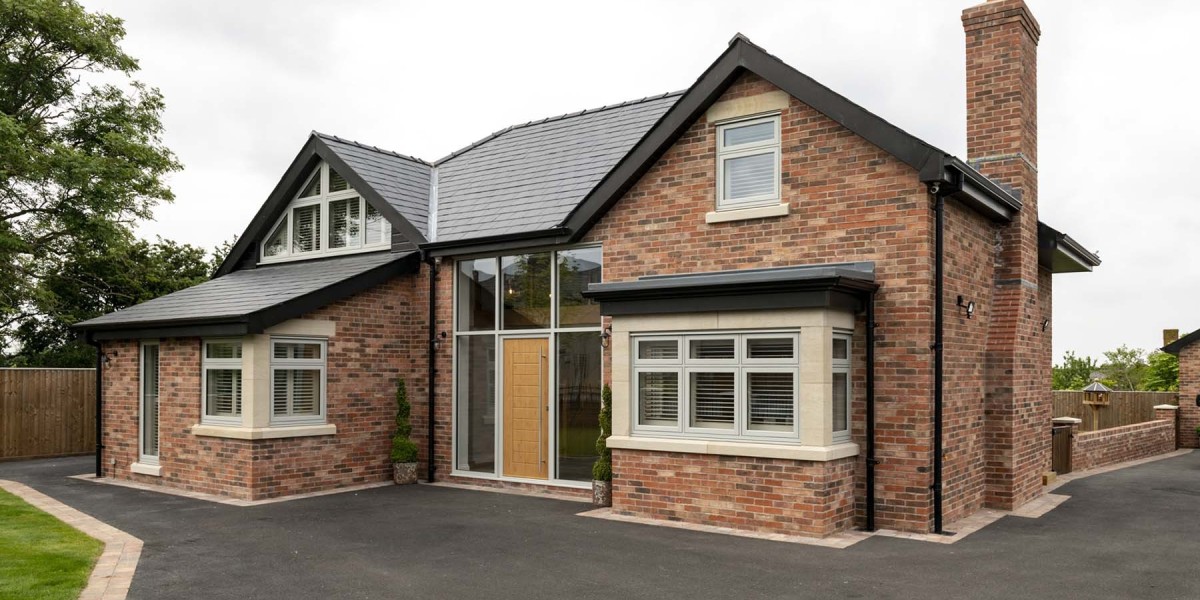Windows play a crucial role in maintaining your home’s comfort, energy efficiency, and aesthetic appeal. Over time, windows can deteriorate, leading to drafts, high energy bills, and a decline in home value. If your windows are old, damaged, or inefficient, replacing them can be a game-changer.
But how do you know when it’s time to replace your windows? Here are some signs:
- Noticeable drafts or increased energy bills
- Difficulty opening and closing windows
- Condensation buildup between panes
- Visible damage such as rotting frames or cracked glass
- Outdated window designs affecting curb appeal
If you're experiencing any of these issues, investing in windows replacement could significantly improve your home’s comfort and efficiency.
Benefits of Replacing Windows
Replacing old windows comes with a range of advantages, including
Improved Energy Efficiency
New windows are designed with better insulation, reducing heat loss in winter and heat gain in summer. Energy-efficient windows, such as double or triple-pane with Low-E coatings, help lower utility bills by maintaining indoor temperatures.
Increased Home Value
Upgrading your windows boosts your property’s curb appeal and market value. Many homeowners see a high return on investment when selling their homes after replacing windows.
Enhanced Security and Safety
Modern windows come with advanced locking mechanisms, impact-resistant glass, and durable materials that make break-ins more difficult, ensuring better safety for your home and family.
Noise Reduction Benefits
If you live near a busy street or noisy neighborhood, double or triple-pane windows significantly reduce external noise, creating a more peaceful indoor environment.
Types of Replacement Windows
Choosing the right type of window depends on your home’s architecture, budget, and functional needs. Here are the most popular window types:
Single-Hung and Double-Hung Windows
- Single-hung: The top sash remains fixed, while the bottom sash moves up and down.
- Double-hung: Both sashes are operable, allowing for better ventilation.
Casement Windows
These windows open outward like a door using a crank handle, offering excellent ventilation and a tight seal when closed.
Sliding Windows
Ideal for modern homes, these windows glide horizontally along a track, providing easy operation and space-saving benefits.
Bay and Bow Windows
- Bay windows: Extend outward with a central fixed window and two side-operable windows.
- Bow windows: Have a curved structure with multiple panels, creating a panoramic view.
Awning and Hopper Windows
- Awning windows: Hinged at the top, they open outward, great for rainy climates.
- Hopper windows: Hinged at the bottom and open inward, commonly used in basements.
Picture and Specialty Windows
These are fixed windows that don’t open, often used for large glass expanses to allow more natural light.
Choosing the Right Window Material
The material of your windows determines durability, energy efficiency, and maintenance requirements.
Vinyl Windows
- Affordable and low maintenance
- Excellent insulation properties
- Available in various colors and styles
Wood Windows
- Classic and elegant appearance
- Good insulation but requires maintenance
- Can be painted or stained for customization
Aluminum Windows
- Strong and durable, ideal for modern designs
- Low maintenance but less energy-efficient than other options
Fiberglass Windows
- Highly durable and energy-efficient
- Resistant to weathering and warping
- Mimics the appearance of wood without high maintenance
Understanding Window Glass Options
Choosing the right glass is crucial for energy efficiency and comfort.
- Single-Pane vs. Double-Pane vs. Triple-Pane: More panes provide better insulation.
- Low-E Glass Coatings: Reflects heat while allowing light in, reducing energy costs.
- Gas-Filled Windows: Argon or krypton gas between panes enhances insulation.
Window Replacement Process – Step by Step
Replacing windows involves several crucial steps to ensure a proper fit and long-term performance. Here’s a breakdown of the process:
Assessing Your Current Windows
Before replacing your windows, evaluate their condition. Look for signs like drafts, condensation, rotting frames, or difficulty opening and closing. If repairs won’t solve the issue, a full replacement is the best option.
Measuring for the Right Fit
Accurate measurements are essential for a successful window replacement. Measure the height, width, and depth of the existing window opening to ensure a precise fit. If you’re unsure, hiring a professional for measurements is recommended.
Choosing Professional Installation vs. DIY
- Professional Installation: Ensures expertise, proper sealing, and warranty coverage.
- DIY Installation: Suitable for experienced DIYers but can be risky if measurements or installation are incorrect.
A poorly installed window can lead to drafts, leaks, and energy inefficiency, so choosing a professional is often the safer option.
Cost of Window Replacement
The cost of replacing windows varies based on several factors. Here’s what influences pricing:
Factors Affecting Window Replacement Costs
- Window size and type – Larger or custom-shaped windows cost more.
- Material choice – Vinyl is more affordable, while wood and fiberglass are premium options.
- Glass type – Double or triple-pane windows with Low-E coatings increase costs.
- Installation complexity – Structural changes or custom fitting add to labor costs.
Cost Comparison by Material and Style
Window Type | Average Cost Per Window (Installed) |
Single-Hung | $200 – $600 |
Double-Hung | $300 – $900 |
Casement | $400 – $1,000 |
Sliding | $300 – $1,200 |
Bay/Bow | $1,000 – $4,500 |
Awning | $350 – $1,200 |
Picture | $400 – $2,000 |
Budgeting Tips for Affordable Window Replacement
- Get multiple quotes from contractors.
- Consider energy-efficient models that qualify for rebates.
- Replace multiple windows at once to get bulk discounts.
- Look for financing options or payment plans from window companies.
Hiring a Professional vs. DIY Window Replacement
Pros and Cons of Hiring a Contractor
✅ Professional expertise ensures correct installation
✅ Faster and more efficient process
✅ Warranty coverage on materials and labor
❌ Higher labor costs compared to DIY
When DIY Window Replacement Makes Sense
If you have experience with carpentry and installation, DIY window replacement can save money. However, mistakes in sealing, insulation, or measurements can lead to costly issues. For complex installations, hiring a professional is best.
How to Prepare for Window Replacement
Proper preparation ensures a smooth installation process.
Steps to Take Before Installation Day
- Remove curtains, blinds, or window coverings.
- Clear furniture and obstacles around the window area.
- Notify your installer about any special requirements.
Clearing Space and Protecting Furniture
Dust and debris are inevitable during installation. Cover furniture with plastic sheets and clear pathways to ensure the workers have easy access.
What to Expect During Installation
- Old windows are removed carefully.
- The opening is inspected for damages or necessary repairs.
- New windows are installed, sealed, and tested for functionality.
- Final cleanup and disposal of old materials.
Common Mistakes to Avoid When Replacing Windows
Choosing the Wrong Window Type
Make sure the style and functionality fit your home’s needs. For example, double-hung windows are great for ventilation, while picture windows provide expansive views.
Improper Measurements and Installations
Incorrect sizing leads to poor sealing, drafts, and water damage. Always double-check measurements or hire a professional for accuracy.
Ignoring Energy Efficiency Ratings
Look for ENERGY STAR-rated windows to maximize energy savings. Investing in high-quality insulation will save money in the long run.
Window Maintenance After Replacement
Tips to Extend Window Lifespan
- Regularly clean the glass, frames, and tracks.
- Inspect weather stripping for wear and tear.
- Lubricate hinges and moving parts for smooth operation.
Cleaning and Care Recommendations
- Use a mild detergent and a soft cloth to clean the glass.
- Avoid abrasive chemicals that can damage window coatings.
- Keep window tracks free of dust and debris.
Checking for Leaks and Drafts
Seal any small gaps with caulk or weather stripping to prevent air leakage. Periodic inspections help maintain energy efficiency.
Energy Efficiency and Environmental Impact
How Replacement Windows Reduce Energy Bills
New windows reduce heat transfer, keeping your home warmer in winter and cooler in summer. This leads to lower heating and cooling costs.
Eco-Friendly Window Materials
- Vinyl: Recyclable and low maintenance.
- Wood: Sustainable and renewable but requires upkeep.
- Fiberglass: Energy-efficient and durable.
Government Incentives for Energy-Efficient Windows
Many states offer tax credits or rebates for homeowners who install energy-efficient windows. Check local programs to see if you qualify.
Comparing Window Replacement Companies
How to Find a Reputable Company
- Read customer reviews and testimonials.
- Verify licenses and certifications.
- Check warranties offered by manufacturers and installers.
Questions to Ask Before Hiring
- What brands and materials do you offer?
- Do you provide warranties on both materials and labor?
- Can you provide references from past clients?
Red Flags to Watch Out For
- Extremely low estimates (may indicate poor quality).
- Lack of proper licenses or insurance.
- High-pressure sales tactics.
Signs You Need Window Repairs Instead of Replacement
Minor Repairs vs. Full Replacement
Sometimes, simple repairs can extend the life of your windows. If the frames are in good condition and only the glass or seals are damaged, repairs may suffice.
When to Seal, Reglaze, or Replace Parts
- Seal leaks: If drafts are minor, caulking or weather stripping can fix them.
- Reglaze glass: If only the glass is cracked, replacing the pane is a cost-effective option.
- Replace parts: If the window frame is intact but locks or hinges are broken, partial repairs can restore functionality.
Replacing windows is a worthwhile investment that enhances your home’s energy efficiency, security, and value. Whether you choose a professional installation or a DIY approach, proper planning ensures the best results. Consider your budget, window materials, and style preferences to make an informed decision.
If your windows are old, drafty, or damaged, now is the perfect time to upgrade. With modern energy-efficient designs, you can enjoy a more comfortable and cost-effective home.
Contacts:
Address:– 4447 46 Ave SE unit 131, Calgary, AB T2B 3N6
Phone Number:– +1(403) 774-7202
Social Media:
https://www.facebook.com/windowsealwestyyc
https://twitter.com/windowswestca
https://www.youtube.com/channel/UCqytfR6dowjdZcFcnhlES1Q
https://www.instagram.com/windowsealwest/
https://www.tiktok.com/@windowsealwest
https://www.pinterest.ca/windowswestca/
https://ca.linkedin.com/company/window-seal-west—calgary-window-replacement-&-installation



